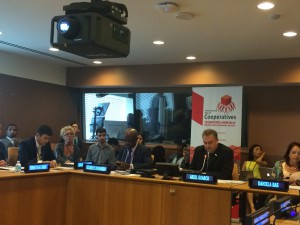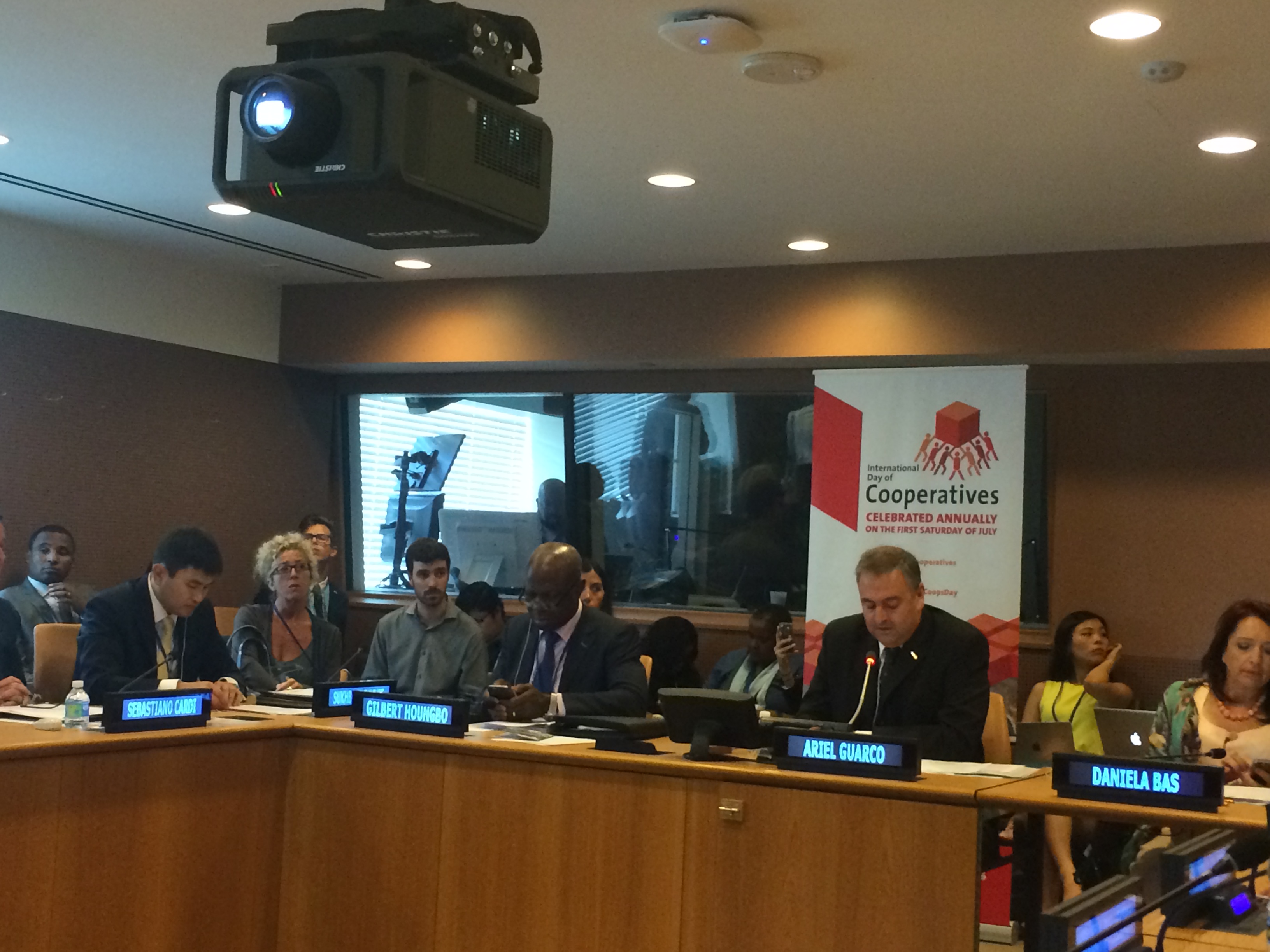On 11 July 2016, high-level representatives of government, the United Nations, cooperatives, civil society, and the COPAC membership convened at the UN to celebrate the International Day of Cooperatives.
More than sixty people participated in the event, which was followed by a lunch to visit the COPAC photo exhibition, “Cooperatives: The power to act for a sustainable future”. See the exhibition catalogue.
 The event focused on the innovative approaches of cooperatives to achieve the Sustainable Development Goals (SDGs).
The event focused on the innovative approaches of cooperatives to achieve the Sustainable Development Goals (SDGs).
Ariel Guarco, President of the Co-operative Confederation of Argentina (COOPERAR) chaired the event on behalf of the International Co-operative Alliance. In his opening remarks, Mr. Guarco said, “A cooperative does not have to be convinced to be socially responsible. A cooperative is social responsibility in enterprise form. This is why we are optimistic about our ability to contribute to sustainable development. Our values and our practices make us predisposed to do so.”
Following Mr. Guarco was Daniela Bas, Director of the Division for Social Policy and Development (DSPD) for the UN Department of Economic and Social Affairs (UNDESA). Ms. Bas said, “What makes cooperatives unique and different is their enormous capacity to empower their members.”
She suggested planning a major event around cooperatives during the Commission for Social Development, which will next take place on 1-10 February 2017. This would be a way to mainstream cooperatives, create more partnerships, and use the momentum to propel beyond the International Day.
Gilbert Houngbo, Deputy Director-General for Field Operations & Partnerships of the International Labour Organization (ILO), discussed the ILO’s long history with cooperatives:
“As values-driven, principle-based enterprises, cooperatives have always been and will continue to be natural and important partners for the ILO: in creating good-quality employment, in providing social protection for their member-owners and communities, and in giving voice and representation to those who have often found themselves excluded from democratic decision-making.”
Mahmoud Mohieldin, Senior Vice President for the 2030 Development Agenda, United Nations Relations, and Partnerships of the World Bank Group, highlighted the importance of data, implementation, and finance to achieve the SDGs.
“As we search for innovative solutions to today’s development challenges, we should consider what the cooperative movement can offer. That means not only greater economic inclusion, higher agricultural productivity, strengthened food security, and financial stability, but also lessons concerning responsible and sustainable business practices, corporate governance, and community relations,” said Mr. Mohieldin.
Government officials then took the floor to share national perspectives. His Excellency Sadique Kebonang, Assistant Minister for Investment, Trade, and Industry in Botswana, said, “Cooperatives in Botswana are used as an engine for economic growth, poverty eradication, and employment creation…The Department of Co-operatives has therefore developed the Co-operative Transformation Strategy for Botswana which came into effect in 2013, with a view to resuscitate, revamp, and re-direct the development of co-operatives into globally competitive businesses.”
His Excellency Sebastiano Cardi, Permanent Representative of Italy to the UN, said, “The Italian government is deeply committed to further strengthening cooperatives and the social economy.” He noted that there are 80,000 cooperatives in Italy, that 30 of the 100 largest companies are cooperatives, and that cooperatives have a higher rate of employment than the domestic employment rate.
His Excellency Sukhbold Sukhee, Permanent Representative of Mongolia to the UN, said during his remarks, “The most common challenges for further development of cooperative enterprises, such as limited access to credit and markets and lack of skilled human and technology resources, need to be further addressed. A better partnership of cooperatives with public, private and non-governmental entities has been considered as a necessary condition for success.”
His Excellency Martín Garcia Moritán, Permanent Representative of Argentina to the UN, then took the floor. “In Argentina, cooperativism has been a part of the solution and response to the challenges of our national history,” he said. “For the 2030 Agenda, the State should provide a vision for leadership. But the government can’t do it alone. Implementation requires the active participation of all stakeholders, who need to invest their creativity and innovative capacity into finding solutions.”
Ms. Bas moderated the next session, “Cooperative solutions: Examples of innovation in achieving the SDGs.” She first addressed Sonia Maria Dias, Waste Sector Specialist for Women in Informal Employment: Globalizing and Organizing (WIEGO), who used the example of waste pickers’ cooperatives in Brazil to show how cooperatives offer decent work and empower women.
“Coops’ focus on mutual help and equality of opportunity can be a way for the marginalized to enter economic niches as collectives,” said Ms. Dias. “This can enable coops to foster sustainable and participatory business because of their commitment to job security, the improvement of working conditions, profit-sharing and the support of members’ social needs.”
Hélène Jolette of the Union des Producteurs Agricoles – Développement International (UPA/DI) in Canada, discussed the potential of innovative partnerships. UPA/ID works with the FAO to help cooperatives and producer organizations in the Maghreb improve food security, through training and increased access to resources and markets.
“Cost-effective local production is essential to food security,” said Ms. Jolette. “I suggest we look for innovative ways to bring together what each actor has to offer.”
William Rolleston, Vice President of the World Farmers’ Organisation, shared how New Zealand cooperatives are contributing to food security, hunger eradication, and the fight against climate change. He noted in particular the example of how cooperatives are joining forces in research and development to harmonize their efforts to increase productivity sustainably.
“When you get farmers engaged, you get real outcomes,” Mr. Rolleston said.
Rodrigo Gouveia, Director of Policy for the ICA, explained how the Co-ops for 2030 platform is helping cooperatives to align their work on sustainable development with the SDGs and share their progress with the world. Cooperatives have already made more than 100 pledges to achieve the SDGs since the platform’s launch on 2nd July.
Next, Mr. Guarco shared the ICA’s International Day of Cooperatives video, which can be viewed here.
In closing, Mr. Guarco said, “This is the huge potential of cooperation. For 170 years we have been creating alternative paths, because for 170 years, cooperators have seen that unless we change the way we produce, the way we distribute, the way we consume, we are heading towards a world that is not sustainable. Cooperatives, for their extensive development in the world, and their ability to create wealth and distribute it in an autonomous and democratic way, are indispensable players in this process.”
See Mahmoud Mohieldin’s article on cooperatives for Project Syndicate.
See the ILO’s list of resources on cooperatives and the SDGs.

